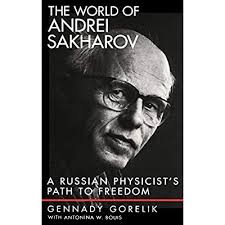
Honoring human rights champion Andrei Sakharov
WHIA- ShareAmerica
By Michael Laff
Renowned musicians will pay tribute to Andrei Sakharov, the famed Russian Nobel Peace Prize laureate, scientist and human rights activist whose ideas about peace and humanity still resonate more than 30 years after his death.

The May 21 event at Carnegie Hall in New York was originally scheduled for 2021 to mark Sakharov’s 100th birthday but was postponed because of COVID-19.
Tatiana Yankelevich, a Harvard University researcher who is Sakharov’s stepdaughter, and pianist Evgeny Kissin discussed the idea of an honorary concert at Carnegie.
“Sakharov was a visionary and a humanist on a global scale,” Yankelevich told ShareAmerica. “Both as a scientist and as a political philosopher, his ideas gave new direction in science and in the way we look at human rights.”

Kissin, a Moscow native who lives in Prague, said Sakharov’s “ideas and moral authority are ever more relevant today.”
From physicist to dissident

Trained as a physicist, Sakharov helped develop the Soviet Union’s hydrogen bomb. He later warned about the consequences of nuclear weapons and criticized Soviet society for its restrictions on personal freedom.
In a memorabe 1968 New YorkTimes essay, he wrote that people who are fortunate to live in open societies should fight for the freedom of people living in closed societies.
In 1970, Sakharov founded a committee to defend human rights and victims of political trials. He called for the release of political prisoners. The European Union has an annual human rights award in his name.
When he was awarded the Nobel Peace Prize in 1975, the committee called Sakharov the “conscience of humanity.” Soviet leaders refused to allow him to travel to Norway to receive the award.

Making sacrifices
Throughout his life Sakharov spoke out even when consequences were severe. He criticized the 1979 Soviet invasion of Afghanistan, lost all his state awards and was sent into internal exile to the closed Soviet city of Gorky. Mikhail Gorbachev allowed him to return to Moscow in 1986.
In March 1989, Sakharov was elected to the new parliament and co-led the democratic opposition. Sakharov died later that same year.
“He understood there would be reprisals,” Yankelevich said. “Even if he had foreseen them, I don’t think that would have changed his mind.”
In January 2023, the Russian government declared the Sakharov Center, a human rights institution in Moscow, “undesirable” and it was forced to close. Sakharov’s personal papers are archived at Harvard University.

Sakharov’s dedication to freedom continues to inspire many worldwide.
In 2015, former U.S. Secretary of State Henry A. Kissinger called Sakharov “a remarkable man whose heroic insistence on the preservation of human dignity in the Soviet Union was a seminal contribution to the cause of freedom in the world.”
In a 2021 letter, President Biden shared “the deep appreciation of the American people for the work and enduring legacy of Dr. Andrei Sakharov.”
The U.S. nonprofit National Endowment for Democracy noted in 2021 that “despite the high personal cost, activists, journalists, lawyers, and ordinary citizens continue to work courageously to realize Sakharov’s vision of peace and human rights.”
Dmitri Daniel Glinski, managing director of the New York-based American Russian-Speaking Association for Civil and Human Rights, compared Sakharov’s influence to Martin Luther King Jr. and Nelson Mandela.
“Sakharov and his human rights movement were the real winners in the Cold War,” Glinski told ShareAmerica.
